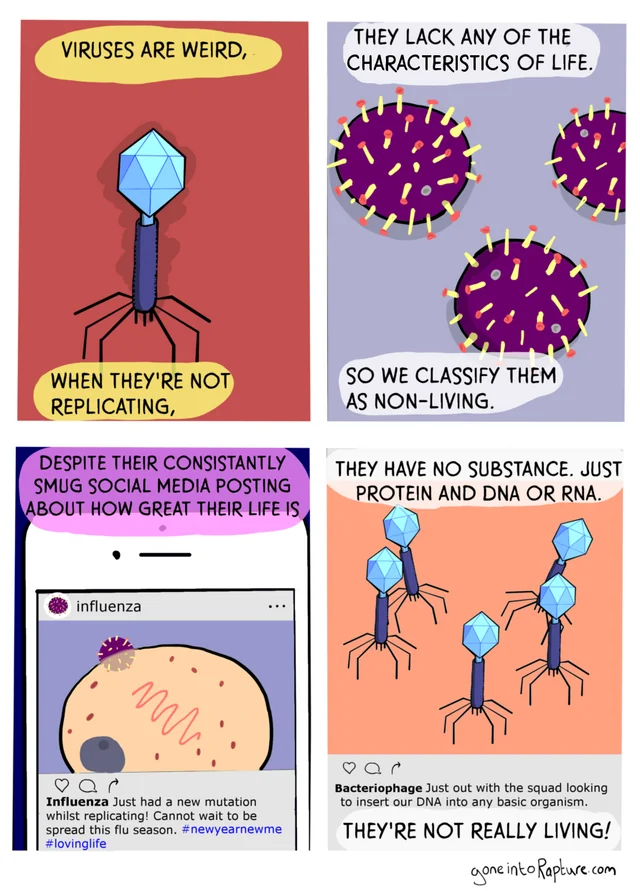this post was submitted on 02 Dec 2024
518 points (99.4% liked)
Science Memes
11299 readers
2542 users here now
Welcome to c/science_memes @ Mander.xyz!
A place for majestic STEMLORD peacocking, as well as memes about the realities of working in a lab.

Rules
- Don't throw mud. Behave like an intellectual and remember the human.
- Keep it rooted (on topic).
- No spam.
- Infographics welcome, get schooled.
This is a science community. We use the Dawkins definition of meme.
Research Committee
Other Mander Communities
Science and Research
Biology and Life Sciences
- [email protected]
- [email protected]
- [email protected]
- [email protected]
- [email protected]
- [email protected]
- [email protected]
- [email protected]
- [email protected]
- [email protected]
- [email protected]
- [email protected]
- [email protected]
- [email protected]
- [email protected]
- [email protected]
- [email protected]
- [email protected]
- [email protected]
- [email protected]
- [email protected]
- [email protected]
- [email protected]
- [email protected]
- !reptiles and [email protected]
Physical Sciences
- [email protected]
- [email protected]
- [email protected]
- [email protected]
- [email protected]
- [email protected]
- [email protected]
- [email protected]
- [email protected]
Humanities and Social Sciences
Practical and Applied Sciences
- !exercise-and [email protected]
- [email protected]
- !self [email protected]
- [email protected]
- [email protected]
- [email protected]
Memes
Miscellaneous
founded 2 years ago
MODERATORS
you are viewing a single comment's thread
view the rest of the comments
view the rest of the comments

This virus on it's own is absolutely useless and can't adjust to it's environment at all. A parasitic wasp is still a seperate entity that has it's own cells and genetic material that covers all basic function of a living thing. A virus is literally just a protein coat protecting a bit of genetic material. A parasitic organism is still doing cellular metabolism even if it isn't in a host organism, but a virus isn't.
Of course it adjusts to its environment -- it even uses it to replicate. Viruses are that branch of the genome which is being minimalist about its seed pods, other branches need all kinds of superfluous stuff like eyes and limbs and brains and whatnot. Complete waste of resources, having pods which can maintain independent homeostasis, what good does that for the homeostasis of the genome? Eh?
Viruses make the simplest prokaryotes look complicated. A bacteria has ribosomes to read nucleic acids to make proteins and enzymes. That's the cellular metabolism that a virus actually lacks. It's not a matter of calling a person a living thing while their cheek cells aren't. You can take human tissue sampes and culture them indefinitely if you wanted to, because those cells are still undergoing cellular metabolism, taking in resources and excreting waste products. A virus doesn't even have the ability to read it's own genetic material. It's a hostile instruction manual.
It's a hostile instruction manual which learns, adapting itself to its surroundings, constantly re-writing and re-inventing how it interacts with the world. Which is more than can be said about most politicians. Forget about physical anatomy, for a second, and consider the species as an organism.
It's not, and i am not going to keep arguing in circles with people who want to contradict basic and agreed upon biology.
I'm not contradicting anything, I didn't even use the word "life". I'm simply taking the perspective of the genome, and fighting against the notion that viruses would act as mechanistically as prions.
And yet, that wasp will die out in a single generation if it's host disappears. It does most of it's own processing, but it's existence is still contingent on a specific host species. Does that make parasites less alive than other life?
Many insects go through a phase of their lives without a mouth or stomach. They can't eat at all and quickly starve. Are they less alive?
Most life would die out if the sun stopped shining. Does that make chemotrophic organisms more alive than phototrophic life?
Chemotrophic life still needs chemicals to eat, and are completely useless without them. Does that make a Boltzmann Brain the most alive thing possible, coming into existence without any outside action whatsoever?
Plants depend on the sun for energy, animals depend on plants for carbohydrates, we depend on animals and plants for carbs and proteins, mayflies depend on stored energy from their larval stage, parasites depend on other organisms for transportation, food, protection, parenting, and even homeostasis. Viruses depending on other cells for reproduction doesn't seem out of place to me.
Consuming resources is a definitive characteristic of living things. Scienctists had to define what life is and viruses just don't click enough boxes. It's the same as astronomers determining what is a planet vs a dwarf planet vs an asteroid or mathematicians deciding that 1 isn't a prime number. There has to be a hard cutoff at some point.
Viruses are rogue genetic material that insert themselves into a host cell and hijack all it's processes and metabolism. Calling them a living thing is like calling malware a computer, or a joke between friends a movie.
Ah, a definition of life in Namibia for a grade 12 course. Quite the scientific authority you have there.
Here's a short paper (Origins of Life and Evolution of the Biosphere 32, 387-393, 2002) that refutes your position that a single definition of life is definitively agreed upon.
Here's a paper (Synthese, 2012) on how a definition of life is impossible and pointless.
There is a species of dog that infects other dogs as a parasite. There are viruses with larger genomes than some bacteria. Obligate parasites and endosymbiotes often lose large portions of their genome and depend on their hosts for their vital functions. Nature doesn't care about are definitions, and biology hates hard cutoffs.